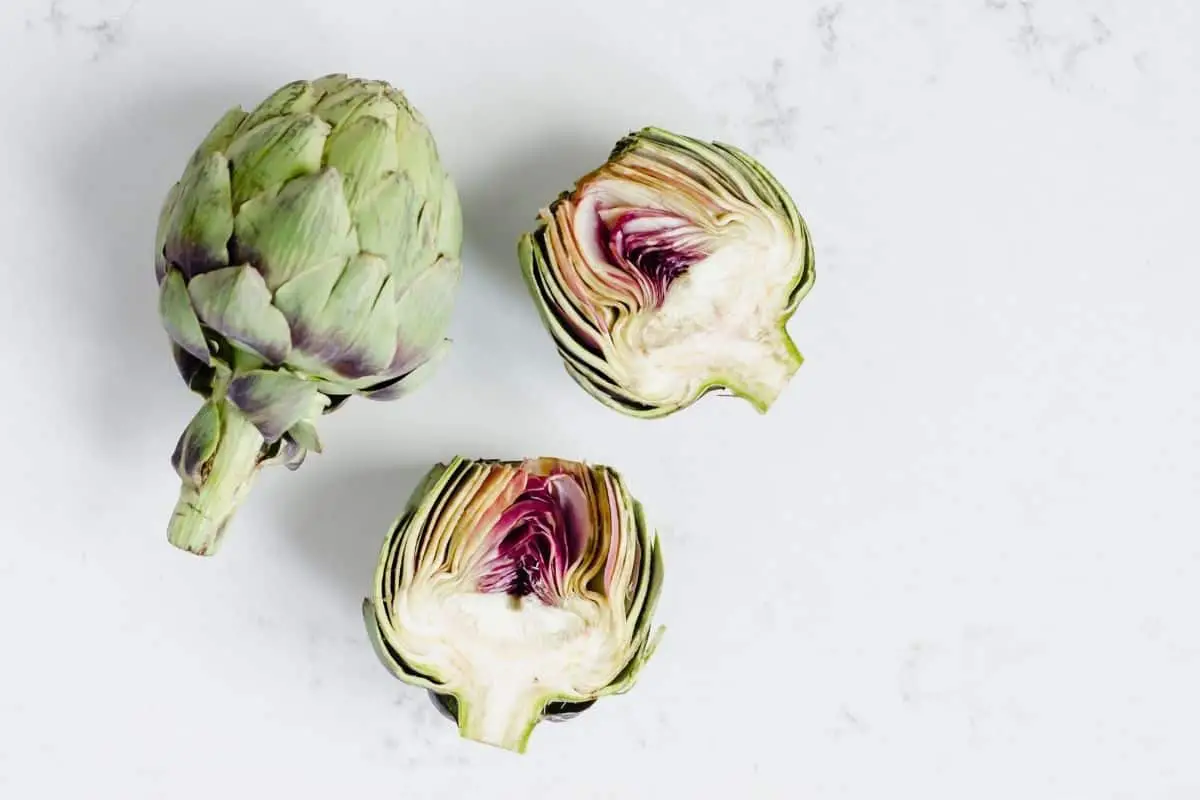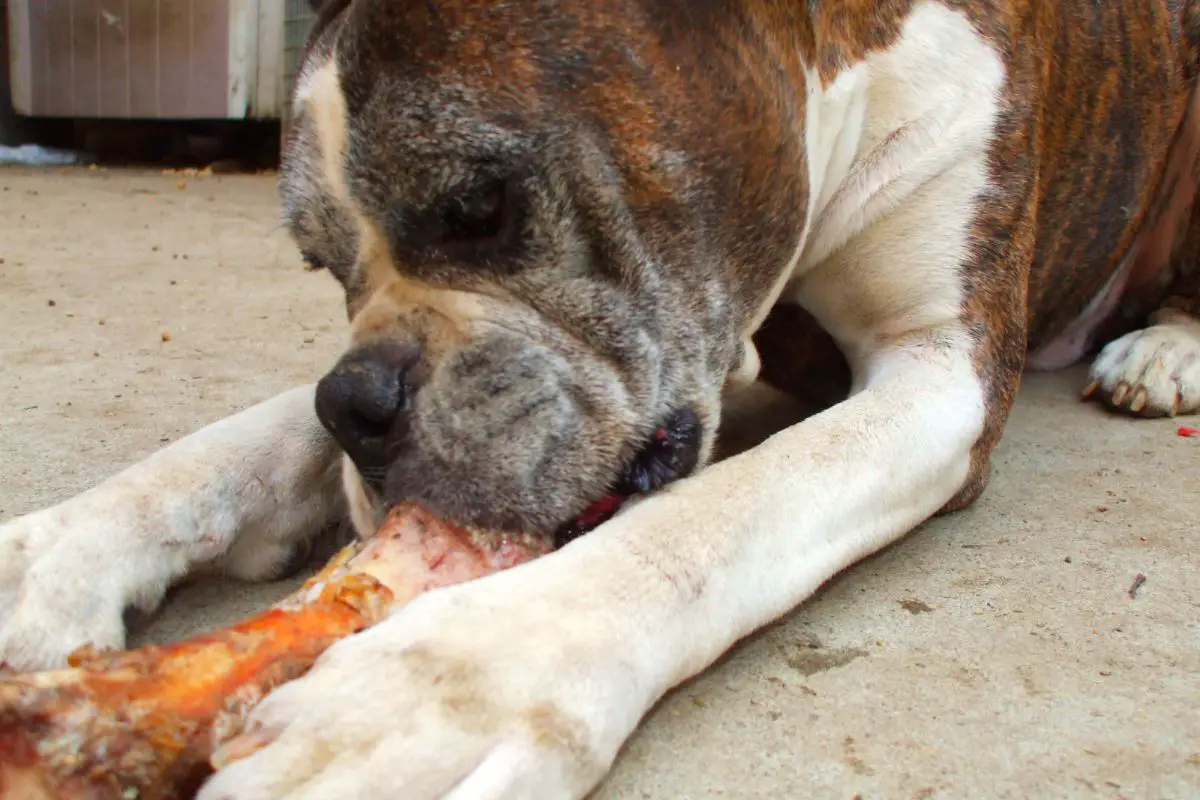This post contains affiliate links.
Artichokes have an interesting history, and though a popular food source today, historically, the fruit was a delicacy reserved for royalty. During that time, dogs would not have been permitted to eat this food. This history and new discoveries about dogs’ digestive systems might be why people frequently ask if dogs can eat artichokes.
Dogs can eat artichokes, as all parts of the artichoke, including the stem and leaves, are non-toxic to dogs. Most dogs will enjoy the artichoke’s taste and texture and benefit from an occasional artichoke treat as long as it is given in moderation and cut into bite-sized pieces.
There are so many questions regarding artichokes and a dog’s diet that we break this topic down for you. We explain why artichokes are good for dogs, the best ways to give your dog artichokes, and cautions to be aware of when feeding your dog this fruit.
Table of Contents
Why Are Dog Owners Asking About Artichokes?
For many years a common belief was that dogs could eat anything, which likely came about because dogs will eat nearly anything.
Veterinarians have tried diligently to educate pet owners on the dangers of feeding human foods to dogs. Still, the thing to remember is that this ability does not mean they should eat food just because the food is not toxic.
The good news is that artichokes are something dogs can and probably should eat.
Why Are Artichokes Good for Dogs?
Artichokes contain several nutrients that are necessary for good health in humans, but are these nutrients metabolized in the same way in dogs? As it turns out, dogs and humans benefit from the nutrients contained in artichokes, and they make a great treat for your dog. Let’s take a look at why.
Artichokes Are Full of Antioxidants
The same vitamins and minerals that make artichokes good for humans make them suitable for dogs, as they contain a host of antioxidants, which protect dogs from free radicals.
The Makers of Hill’s Science Diet remind us that free radicals are “a by-product of energy production within the body.” This process is naturally occurring in all living things, but if there is too much or too little of it, your pet’s health is negatively impacted.
Feeding your dog food and healthy treats, like artichokes, that are high in antioxidants helps keep free radicals in balance.
Artichokes Contain Vitamin C
Vitamin C is another antioxidant that helps the dog’s body maintain optimal health. Although your dog’s body can make its own vitamin C, the additional support provided by feeding him artichokes in moderation will not hurt him.
Artichokes Are a Good Source of Folic Acid
Folic acid is necessary for red blood cell production, and while a dog’s need for folic acid is relatively small, there are instances where dogs are unable to make enough of this vitamin. Adding artichokes, as well as other foods that contain folic acid, to supplement the dog’s diet should be beneficial.
Artichokes Contain Niacin
Niacin is an essential vitamin for dogs because it helps break down fatty acids, and it plays a role in treating deficiency diseases. Since it is a part of the B vitamin family, it gives your dog energy and creates healthy blood cells that carry oxygen to their muscles.
Artichokes Contain Potassium
Potassium is an electrolyte or mineral, and, according to ParsleyPet, it is essential to your dog’s health because it “aids in the functioning of electrical charges in the heart, nerves, and muscles.” They say that if your dog is tired all of the time or has no desire to eat, it may be low in potassium.
One way to get them this needed potassium is to feed them artichokes, but a vet should analyze these symptoms before coming to a diagnosis.
Artichokes Are a Low-Calorie Treat
Dogs enjoy eating and are motivated by food, but this preference for food can cause health issues related to obesity if dogs fail to eat a healthy, nutritious diet. If your dog likes artichokes, this raw fruit is a highly nutritious choice that will help keep the weight off while increasing the necessary vitamins and minerals.
Artichokes Are High in Fiber
Dogs’ digestive tracts are different from ours in many ways, but they are similar in terms of fiber needs, and just like our system, fiber helps keep dogs’ digestive tracts regular. In addition, fiber can act as a probiotic in a dog’s gut by helping to maintain a normal PH balance so that unhealthy bacteria cannot grow and healthy bacteria remain in place.
Artichokes Are High in Magnesium
Jennifer Coates, a veterinarian, and writer for Pet MD explain that magnesium is a macromineral that can only be obtained from foods and supplements because the body cannot make it on its own.
Dogs need magnesium to help them maintain optimal nerve and muscle functions and helps support their immune system. Artichokes alone will not give dogs the magnesium they need, but they are an excellent supplemental instrument as you work to give your dog the nutrition he needs.
Artichokes Are High in Vitamin K
Vitamin K is not a nutrient that we hear about a lot unless our pet has a Vitamin K deficiency. It is what gives your dog’s blood the ability to clot, so having the right amount of this vitamin is crucial in the event your dog is ever hurt.
Although artichokes alone will not provide the daily nutritional value of vitamin K for your pet, adding artichokes to his already well-balanced diet can be beneficial.
Best Ways To Give Your Dog Artichokes
Although artichokes are good for dogs, like people, some dogs may not like the fruit’s taste.
If you offer it once or twice and your dog does not like it, you’ll want to stop trying. You will know if your dog likes the artichoke if he starts begging for it again, licks his lips, or starts to paw at your leg for more.
If your dog does not show signs of enjoying the food, there is no reason to withhold it if he asks for it later, but neither is there a reason to try to make him like it. Artichokes’ benefits can be obtained in nutritious dog food with healthy treats, so do not worry if your dog is not a fan of artichokes.
Remember, some people do not like them either.
Fortunately, most dogs enjoy artichokes, either because they like the taste or because they think they are getting away with eating human food. Either way, both you and the dog benefit from adding artichokes to his diet.
The following are some ideas to help guide you in introducing artichokes to your dog.
- Start slow. Although artichokes are good for dogs, and most dogs like them, artichokes are still human food. Therefore your dog’s digestive system will need time to adjust to this new food.
- Offer artichokes in moderation. If your dog is anything like mine, he does not know when he has had enough. Giving your dog too much of anything could create digestive and other health issues, like allergies, so start slow and offer in moderation.
- Offer artichokes in small, bite-sized pieces. Dogs tend to devour food, but the artichoke is too large for the dog to swallow whole. Since dogs do not chew their food thoroughly much of the time, bit-sized pieces are always a better option.
- Be careful with how you prepare it. All parts of the artichoke are non-toxic to dogs and are best served raw. However, if you cook the artichoke, it is best to boil or steam it rather than fry it because boiling does not require the use of added fats. Also, be very careful if you elect to season the artichoke because many spices are toxic to dogs.
- Serve fresh. Foods that are canned use an added preservative, and most of those preservatives are not suitable for your dog. So since this food is a treat rather than a necessity, only offer your dog artichokes when you have fresh ones available.
Cautions To Consider When Feeding Artichokes to Your Dog
As stated, artichokes are good for your dog, but artichoke dishes may not be.
Dr. Stephanie Flannsburg Cruz, a veterinarian, recently weighed in on this issue for the website CanIGiveMyDog.com and agrees that artichokes are good for dogs in moderation but warns us to remember that a dog’s digestive system is not identical to ours.
Let’s take a look at some of the things that can happen.
- There is a possibility of an intestinal blockage. Although all parts of the artichoke are safe for dogs to eat, there is a danger for an intestinal blockage to occur. To avoid this problem, make sure that you do not let your dog eat the entire artichoke at once. Dr. Cruz suggests cutting the artichoke into small, easily digestible portions.
- Diarrhea is a concern. Dogs’ developing diarrhea is always a consideration when we give them human food, so when you introduce artichokes to his diet, start slowly.
- Unintended issues can happen. Another consideration is that many artichoke dishes are made with toxic ingredients to dogs. While the artichoke is entirely safe, the garlic it was prepared with is toxic to your dog, so make sure the artichoke is in its raw form and cut into small, bite-size pieces.
Conclusion
There are so many foods that we have to withhold from our dogs, so it is exciting when we learn there are human foods we can share with our pets.
Artichokes are in that category, and when fed raw, in moderation, and cut into easily digestible pieces, dogs can eat artichokes and will actually benefit from eating them. If you are in doubt, or notice issues after feeding your dog an artichoke, definitely contact your veterinarian, but artichokes are a fruit that most dogs can eat.
Related Articles
- Can Dogs Eat Asparagus? (We Asked the Experts)
- Can Dogs Eat Basil? Here’s What the Expert Says
- Can Dogs Eat Bell Peppers? We Asked the Experts
- Can Dogs Eat Black Licorice? Read This First!
- Can Dogs Eat Black Pepper? Here’s What the Expert Says
Sources
- Easy Pet MD: Artichokes
- World of Puppies: Can Dogs Eat Artichokes?
- Paws GIve Me Purpose: To Eat or Not to Eat: Artichokes
- Can I Give My Dog.Com: Read This Before Feeding Your Dog Artichokes
- Hills: Benefits of Antioxidants in Pet Food
- PETMD: What is Magnesium and Why is it Important?
- Parsley Pet: 3 Easy Ways to Add Potassium to Your Dog’s Diet
Mrdogfood.com is a participant in the Amazon Services LLC Associates Program, an affiliate advertising program designed to provide a means for sites to earn advertising fees by advertising and linking to Amazon.com. We also participate in other affiliate programs which compensate us for referring traffic.




